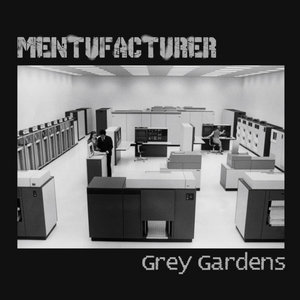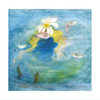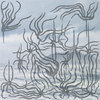Grey Gardens by Mentufacturer

"Grey Gardens" is surely one of the most beautifully perverse, paradoxical and tragic titles in the English language. It has all the alliterative poetry of its close relative : "Green Garden", the Platonic ideal for a garden. And yet, it is the devastated opposite : the last thing a garden should be is "grey". Colourless and without life.
How could anyone expect to name a mansion "Grey Gardens" and NOT have it turn into a madhouse? A place where beauty ritually disintegrates into squalor?
It's this sense of self-opposition and self-sabotage that runs through this new EP and is the real inspiration behind it. More than the documentary of the same name. Although there are occasional flickers of ideas from that documentary. The theme of mothers and daughters. Of hopes and ambitions thwarted. Little Edie's contention that "It's very difficult to keep the line between the past and the present."
But the EP really came together with the introduction of a completely different element : my fascination with photographs of old mainframe computers from the 1950s and 1960s. Usually IBM publicity shots and adverts. These are VERY grey. Some are merely black and white. But others are brightly coloured photos, where the boxes have elegant splashes of coloured branding : either blue or red. And yet most of the computer equipment and the hygienically clean room it occupies, still manage to be very grey. It's not quite the aesthetic of old test equipment that some synthesists fetishize. Because that equipment often has a patina of ageing about it. In contrast, these photos are from the time when the computers were new. It's a bright grey techno-futurism at the tip of the spear of high modernism. These places look so very dead, and sterile. And alive with possibility at the same time.
As an aside, the term "Machine Gardens" resonates strongly with me. I have often used it : for chapters of unwritten novels, for pieces of music, for interactive digital art works. Claus Emmeche has a classic book on artificial life entitled "The Garden in the Machine". Machines and gardens are a fascinating, fecund pairing.
And yet this is not a "Machine Gardens" album. It's something sadder, stranger and even more convoluted. When I hit on the idea of using one of these photos of the grey mainframe world that might be teeming with potential as the cover image of an EP called "Grey Gardens", I knew I had found the convoluted paradoxical heart and soul of what this work should be. In a very real sense, the "theme", the "raisan d'etre", of this EP, just is to be an EP called "Grey Gardens" with a grey picture of an IBM mainframe on the cover. With all the confused symbolic and cognitive resonances and dissonances that that should invoke.
There's more. These tracks were largely "finished" between mid 2023 and early 2024, in a time of political pessimism, before Joe Biden gave up on his aspirations for a second presidential run, and, as a consequence, a Trump win looked inevitable. It was a world of problematic gerontocracy. Of rising reaction. A world where the future felt smothered by failure to give up on the dreams of the past. (This is, as well, one of the narratives of the Grey Gardens documentary. "It's very difficult to keep the line between the past and the present.")
It's kind of the opposite of "Hauntology". Musical Hauntology often invokes the optimism and progressivism of the past to try to reinvigorate the present. In Grey Gardens the pleasures of the past weigh heavily on the present, preventing it living and truly growing into the future.
Early sketches of most of these tracks more or less existed and had been organized into a whole BEFORE I came up with the theme. They aren't exactly illustrations of the theme. But they were clearly the latest continuation of the Mentufacturer project and aesthetic. Which is largely about juxtaposing and uniting opposites and bizarre chimera of tradition, melody and experimentalism. This music is not like the Green Fairy (https://dionysian-industrial.bandcamp.com/album/mentufacturer-chases-the-green-fairy) - exercises in computer aided music theory. Only the Grey Gardens Theme itself and the bonus hidden track, Birthday Girl are actually made with the GoldenPond library (https://gilbertlisterresearch.com/GoldenPond.html). Most of these tracks are based on chord-progressions that were written by hand. But it is very much informed by my experiments in learning traditional music theory. Grey Gardens is not the antithesis of the Green Fairy. But it might be the next dialectical move in my learning. In fact I believe, paradoxically, that this is some of my most "cutting edge" music BECAUSE I also feel it is some of my most accomplished traditional music theory composing. And if that isn't dialectical thinking, I don't know what is :-)
To put this another way, the "Grey Gardens" theme (with all the juxtaposed oppositions I've related above), feels like the inevitable development and extension of the "sepia" phase explored in The "Go Easy" Mixtape and Deeper into Sepia. Grey IS the new sepia. I'm always a fan of my own work. (Which isn't a good thing for critical reflection). So I have been enjoying listening to Grey Gardens way too much. But I believe it has struck a good balance : less random than The Go Easy Mixtape, and lighter and less obsessively overworked than Deeper into Sepia. In some ways it reminds me of Grim Christmas, which is an equivalent lengthed EP of breezy sketches. Though Grey Gardens is more worked-on than that.
"But Mr. Mentufacturer," I hear some of you ask. "What's with all the quacking? Half the tracks sound like they've been invaded by demented ducks!"
Yeah. I'm not sure. That just kind of happened. But I like it. Or, rather, I think it works for the theme here. In fact, I think unconsciously, when I was choosing the last tracks for inclusion in the EP, I was actually selecting for tunes that had something similar. They just seemed to fit. A good example is Engines of Creation, the oldest tune here. It's about two years older than the other tracks, but I never had a place to put it before. Now it sounds like it clearly belongs here.
Tracklist
Credits
All tracks written and composed by Mentufacturer
License
CC BY-SA 3.0. See the Creative Commons website for details.
Originally conceived as an industrial band in the early 90s, Mentufacturer is a solo electronic project of Phil Jones, who has grown up to admit a love for melody, repetitive mantras and broken beats.
Originalmente concebido como um banda industrial nos anos 90s, hoje Mentufacturer faz musica eletrônica com varias influências, finalmente admitindo o gosto pela polirritmia e mantras melódicos.
synaesmedia.net
Mentufacturer's Zed Sessions
open.spotify.com
gilbertlisterresearch.com
OVNI-lounge






